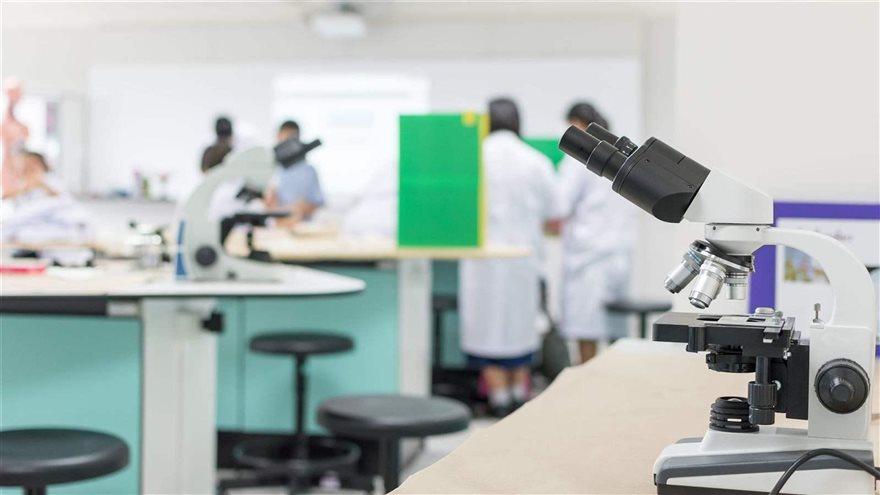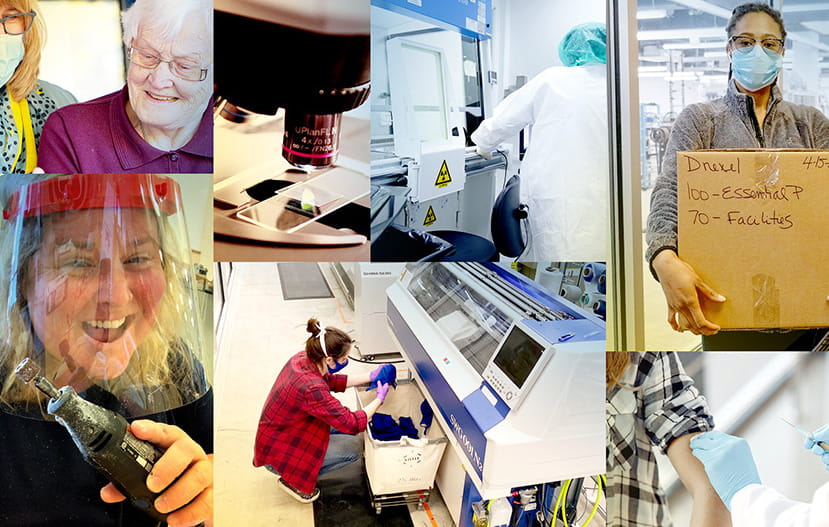Drexel Takes Top Spot on National Rankings for Innovation

- Dragons on Fire: Kudos for Student Achievement: Summer 2025
- Video Game Design Reaches New Heights in 'Skyscraper Games'
- Drexel Researchers Gain New Insights from Malaria-Causing Parasite That May Support Development of Future Antimalarial Drugs
- Autism Researchers Explore Role of Environmental Influences on Autism as Part of Multi-Million Dollar NIH Effort

A new report by the George W. Bush Institute and Opus Faveo Innovation Development recently named Drexel University the most innovative mid-sized research university in the country.
These two organizations — the former an offshoot of the George W. Bush Center that is located on the campus of Southern Methodist University and advocates for leadership, policy and action to solve current issues; the latter an innovation consulting firm with university clients including the University of Texas Dallas, Texas Tech University and the University of Michigan — released these first-of-their-kind rankings as a review of the productivity and influence of colleges and universities across the country. Drexel scored the highest marks of its category.
“The Innovation Impact of U.S. Universities,” which was released June 15, named Drexel one of the “outstanding performers in terms of productivity in converting research inputs to innovation impact outputs.” When evaluated for its productivity related to research, teaching, commercialization and entrepreneurship, Drexel “scores far higher than any member of the largest university group,” according to the report. In its own group of mid-sized research universities, Drexel was clearly ahead of the universities taking second through fourth place: the University of New Mexico, Princeton University and Carnegie Mellon University, respectively.
“Drexel shows what a university can achieve in innovation impact when it prioritizes innovation throughout the institution and engages broadly in its home city,” the report stated while mentioning Drexel’s Charles D. Close School of Entrepreneurship, the ExCITe Center and ic@3401. The report also praised the University’s stance on technology commercialization such as having associate deans of research as advocates of commercialization programs like the Drexel Coulter Translational Research Program and programs offered by Drexel Applied Innovation.
“I’m incredibly proud of this much-deserved distinction for our research and innovation enterprise, which shows that the investments we’ve made to build an innovation ecosystem in University City are paying off,” Drexel President John Fry said.
The report considered data from various sources such as Google Scholar, Google Patents, the National Science Foundation and the Association of University Technology Managers (AUTM) and evaluated the U.S. research institutions under four categories: research, teaching, commercialization and entrepreneurship. The research score is based on patent and publication citations while the teaching score is based on the number of STEM graduates at doctoral, master’s and bachelor’s levels. Commercialization and entrepreneurship scores are based on academic tech transfer metrics such as number of license agreements signed, patents issued, income from licensing operations and number of startup companies formed. The aggregate scores, based on all four components, are then adjusted by the size of the research enterprise to arrive at the final “innovation impact productivity” rankings.
“This ranking is a reflection of Drexel's long-standing history of attracting talented faculty, staff and students who want to make an impact,” said Executive Vice Provost for Research & Innovation Aleister J. Saunders, PhD. “The ‘Innovation Impact’ report recognizes Drexel's long-standing commitment to improving society by leveraging our basic and applied research activities and our amazing scholars.”
The University excelled particularly in the teaching score and was commended in the report for graduating an average of 447 STEM PhDs per annum — an output exceeded that of “numerous much-larger institutions,” according to the report. In 2018, the University was named one of Forbes’ top 25 STEM schools in the country, in part because over 50 percent of its students majored in STEM subjects.
In 2019, Drexel College of Engineering researchers Michel Barsoum, PhD; Yury Gogotsi, PhD; and alumnus and former Drexel research assistant professor Babak Anasori, PhD, were among the most highly cited researchers globally and were recognized as the top 1% in their fields. The Web of Science, a Clarivate Analytics company, tracks scientists whose volume of published paper citations rank in the top of their fields. According to the National Bureau of Economic Research (NBER), there is a strong correlation between the number of patent citations and patent’s economic and technological importance.
Drexel’s commitment to technology transfer and moving innovation from lab to marketplace helped to achieve high marks for commercialization and entrepreneurship. One successful example is Christian Sell, PhD, an associate professor in the Department of Biochemistry & Molecular Biology in the College of Medicine. His work around rapamycin and its ability to reduce aging in human skin, as previously written about in DrexelNow, was awarded $160,000 in gap funding by the Coulter-Drexel Research Partnership program managed by the School of Biomedical Engineering, Science and Health Systems, which also helped with the team formation and building a high-growth business.
“I can honestly say that without the support of the outstanding team at Drexel we would never have been able to bring this to fruition,” said Sell. The new Drexel spinout startup called Boinca Therapeutics is now well-poised to go after the $128 billion market opportunity.
Another great example is Johann deSa (PhD Biomedical Engineering ‘09) who left his assistant research professor role in 2015 to commercialize an invention that he co-invented in 2010 to form Instadiagnostics which is developing a platform that can rapidly detect disease biomarkers in bodily fluids to promote early diagnosis, improving patient outcomes and significantly cutting down health care costs. deSa and Instadiagnostics recently won a $4.1 million contract from the U.S Department of Defense and credited Drexel for providing valuable help in winning the contract.
“Drexel Applied Innovation’s gap funding enabled us to fill key gaps in our Congressionally Directed Medical Research Program (CDMRP) proposal,” says deSa. “It also made a huge difference to have a Drexel support team with past experience in founding and exiting university startups as a founder.”
It’s no surprise, then, that Drexel is already following, and excelling in, the George W. Bush Institute report’s recommendations for universities: prioritizing research, hiring and retaining top faculty researchers, investing in technology commercialization, instilling a university-wide culture of innovation and entrepreneurship and engaging with its local business and innovation community.
It is also worth noting that the report was released at a time when Drexel has already begun its initial phase of ramping up research activities following the March closure of campus due to the COVID-19 pandemic. And for the last several months, the University has quickly created funding opportunities and other means of support for research projects focused on solving health and health-related issues concerning COVID-19, such as the interdisciplinary groups of faculty supported by the Rapid Response Research & Development Fund.
“Even with the pandemic shutdown, the spirit of research innovation at Drexel has remained strong,” said President Fry in a June 18 message to the University community.
To learn more about the Drexel units contributing to the University’s research and innovation ecosystem:
The Charles D. Close School of Entrepreneurship is the nation’s first freestanding school of entrepreneurship to offer degrees; building on an outstanding foundation of curriculum, programming and thought leadership at Drexel, the Close School is the engine driving the expanded culture of entrepreneurship.
The ExCITe Center hosts a range of research groups, teams and projects with a mission to inspire transdisciplinary research and discovery connecting technology and communities.
The Drexel Coulter Translational Research Program, managed by the School of Biomedical Engineering, Science and Health Systems, develops and realizes the clinical potential of translational research which save, extend and improve patient lives. In its 14th year, the program has awarded $10 million in funding across 61 projects.
ic@3401 is a startup incubator and community of innovators jointly managed by Drexel Applied Innovation and the University City Science Center. ic@3401 member startups have raised over $70 million in investment capital since 2016.
Drexel Applied Innovation, under the Office of Research & Innovation, provides technology licensing, industry sponsored research support and entrepreneurial development services to support the innovative and entrepreneurial endeavors of Drexel innovators.
Drexel News is produced by
University Marketing and Communications.
